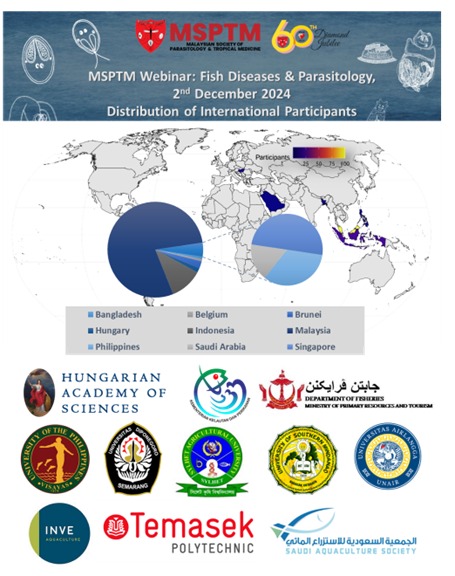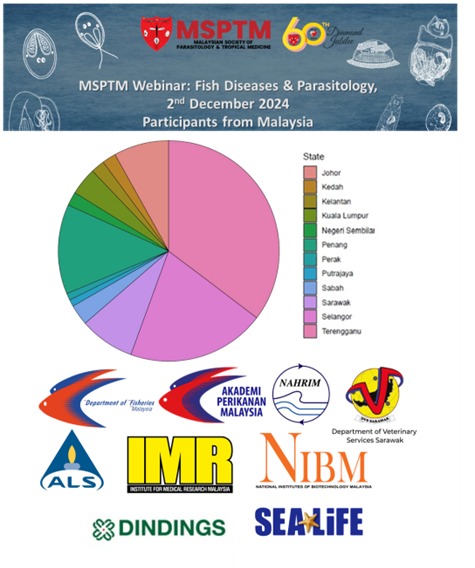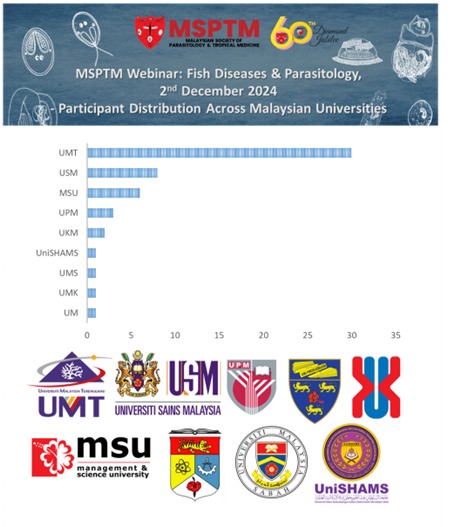
MSPTM
Malaysian Society of Parasitology & Tropical Biomedicine
The Webinar Fish Diseases & Parasitology: Perspectives in Malaysia and Zoonotic Implications
The webinar Fish Diseases & Parasitology: Perspectives in Malaysia and Zoonotic Implications was successfully held on 2nd December 2024, gathering around 160 participants from across the globe. The event attracted representatives from 14 international and 33 local institutions/organizations, providing a platform for discussions on fish health, emerging diseases, and zoonotic risks. The webinar aimed to enhance knowledge sharing and strengthen collaborations among researchers, industry players, and policymakers in the field of fish parasitology and aquatic disease management.
The webinar was moderated by Assoc. Prof. Dr. Muhammad Hafiz Borkhanuddin, Senior Lecturer at the Faculty of Science & Marine Environment, UMT. He facilitated engaging discussions on current challenges, research gaps, and future directions in fish parasitology – and ensured a dynamic exchange of ideas, allowing participants to actively contribute their perspectives and experiences in the field.
The first panel, delivered by Prof. Emeritus Dr. Faizah Sharoum, an Adjunct Professor at the Institute of Tropical Aquaculture (AKUATROP), Universiti Malaysia Terengganu (UMT), provided an in-depth analysis of fish parasitology in Malaysia. She highlighted key research findings on fish health, parasite-host interactions, and aquaculture sustainability. She also emphasized the importance of early detection and preventive measures in managing fish diseases effectively to ensure the sustainability of the aquaculture industry.
The second panel featured Dr. Kua Beng Chu, Senior Deputy Director at the Fisheries Research Institute, Department of Fisheries Malaysia, who shared valuable insights on disease management strategies in Malaysian aquaculture. Her presentation focused on surveillance programs, biosecurity measures, and sustainable control strategies implemented by the government to mitigate disease risks. She stressed the need for continuous research, policy integration, and collaboration among key stakeholders to strengthen disease management in the fisheries sector.
Key topics covered during the webinar included the prevalence of fish parasites in Malaysian aquaculture, zoonotic risks associated with fish parasites, challenges in disease management, advancements in aquaculture health technologies, and the role of government agencies and research institutions in ensuring effective disease control. The discussions underscored the importance of early detection, sustainable treatment methods, and improved biosecurity measures in tackling fish health issues.
The local participants featured government agencies, public and private universities, industry players, aquaculturists, fish farmers, and fisheries-related companies. Key representatives included the Department of Fisheries Malaysia, Institute For Medical Research (IMR), National Institute of Biotechnology Malaysia (NIBM) and Biosekuriti Perikanan Kuala Lumpur. Leading universities like Universiti Sains Malaysia (USM), Universiti Malaysia Terengganu (UMT), and Universiti Putra Malaysia (UPM), were represented alongside private companies such as Dindings Soya & Multifeeds Sdn Bhd, Lay Hong Berhad, and ALS Technichem Biotech Department.
The webinar also brought together international institutions and governmental bodies, included Sylhet Agricultural University (Bangladesh), INVE Aquaculture, Universitas Airlangga, Diponegoro University, Kementerian Kelautan dan Perikanan Republik Indonesia and Department of Fisheries (Brunei Darussalam). The University of Southern Mindanao and University of the Philippines Visayas represented the Philippines, while the Saudi Aquaculture Society highlighted interest from the Middle East. European representation came from HUN-REN Veterinary Medical Research Institute (Hungary), and regional hubs such as Temasek Polytechnic and Mandai Wildlife Group (Singapore) added valuable insights.
In conclusion, the webinar successfully facilitated knowledge exchange and collaboration among local and international experts in fish parasitology and aquaculture health. The event highlighted the need for strengthened partnerships between universities, government agencies, and industry stakeholders to enhance research efforts and disease management strategies. Future recommendations from the discussion emphasized the importance of enhancing disease surveillance programs, increasing awareness on zoonotic risks, adopting advanced diagnostic technologies, and promoting sustainable aquaculture practices.
Related Info-photos:


